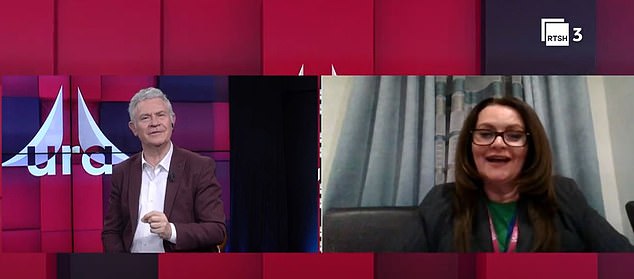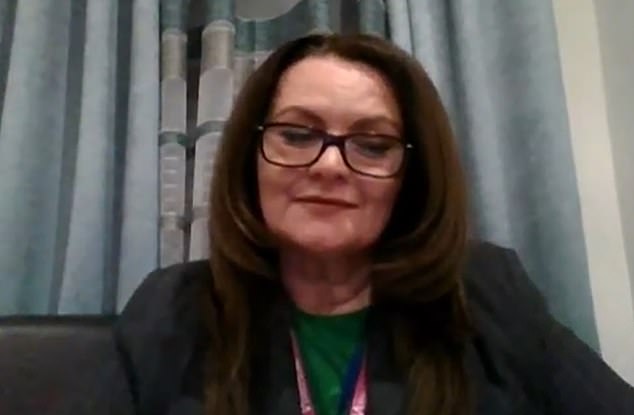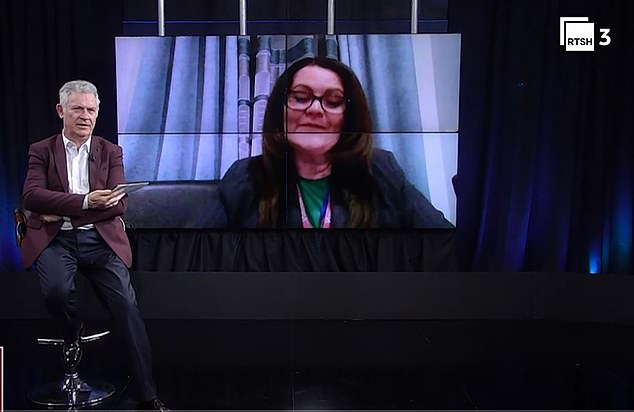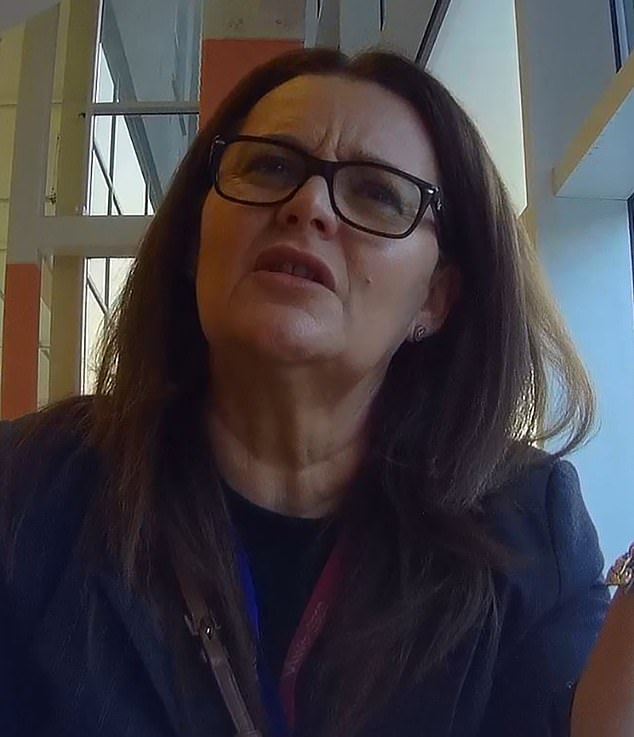During a primetime interview on Albania’s public broadcaster late last month, Eglantina Legisi gave a damning account of the treatment of immigrants in the UK.
New arrivals from the Balkan state in Britain, she complained, were scared to register at schools and hospitals because they feared they would be deported.
Many were already traumatised after crossing the Channel on small boats, she said.
‘People should say they have mental health in order to get asylum,’ she told the interviewer during her half-hour segment on the show Ura – meaning Bridge – which is dedicated to the Albanian diaspora.
‘I met a young man who told me that he missed his trial date and told the social worker if he was going to be deported he would kill himself.’
As a freelance translator working for the Home Office dealing with courts, prisons and the police, she considered herself an authority on the UK’s failings in such matters.
‘I deal with immigration cases on a daily basis,’ she said. ‘The asylum system is chaotic.’
But unbeknown to viewers, at the very moment she was publicly berating the British authorities she was also plotting to fraudulently undermine the system she was criticising.

During a primetime interview on Albania’s public broadcaster late last month, Eglantina Legisi gave a damning account of the treatment of immigrants in the UK, But unbeknown to viewers, at the very moment she was publicly berating the British authorities she was also plotting to fraudulently undermine the system she was criticising

‘People should say they have mental health in order to get asylum,’ she told the interviewer during her half-hour segment on the show Ura – meaning Bridge – which is dedicated to the Albanian diaspora

As a freelance translator working for the Home Office dealing with courts, prisons and the police, she considered herself an authority on the UK’s failings in such matters
Two days earlier she had given a detailed explanation to an undercover reporter about a money-spinning scam she runs with other Home Office interpreters to provide fake guarantors that dupe judges into granting bail for illegal immigrants.
And hours before her TV appearance she had been arranging for the reporter to meet a solicitor who would take the case.
The Mail first began investigating after monitoring posts by families of immigrants held in detention centres requesting guarantors on Facebook groups set up for Albanians in the UK.
Eglantina Legisi responded to three of these, urging those needing a guarantor to get in touch with her.
When an undercover reporter posing as the relative of an illegal immigrant in detention messaged her she said that, for a £3,000 payment plus £1,000 for the surety, he could hire another interpreter who also did work for the Home Office to act as a guarantor to vouch for him in a bail hearing.
Ms Legisi subsequently met with a second undercover reporter near her home in Welling, Kent, where she lives with her teenage son after arriving in Dover on the back of a lorry 15 years ago.
During the meeting she told the Mail she plans to return to Albania after five years when her son finishes university here, to be reunited with her husband who still lives there.
In the meantime her work as a freelance translator for the Home Office means she is perfectly placed to organise an illicit scheme to help illegal migrants.

Two days earlier she had given a detailed explanation to an undercover reporter about a money-spinning scam she runs with other Home Office interpreters to provide fake guarantors that dupe judges into granting bail for illegal immigrants. Pictured: A grab from a video taken by the undercover reports
Explaining how it works, she dismissed concerns that the judge might realise the immigrant and guarantor didn’t know each other, saying that she and the solicitor would brief them ahead of the bail hearing and they would only be asked a few basic questions when in court.
The guarantor would pretend to be a family friend rather than a direct relative to make it appear more plausible, she said.
‘We prepare. Solicitor will prepare him. He knows to teach him what to say.’
The authorities would trust the guarantor she was providing because she had a ‘good job’ and her husband ran a successful building company.
The guarantor would tell the judge that the immigrant will live at their home if released, she said.
‘The first thing is address because if they release him they want to know where he’s going to stay. Even if he doesn’t live in the guarantor’s house in one week or two weeks, we find something, or you find the address, just fake address.’
She said as long as he wasn’t tagged, he could unofficially get a job. ‘Everybody is working, my God, in restaurants and building, everywhere.’
She said her translation work for the Home Office meant she knew ‘everything’ about the immigration system. ‘We know how it works. We know the rules.’
She said the solicitor she worked with knew they would be using a fake guarantor and ‘everything’ they were doing.
Laughing, she added: ‘He knows Albanians. Don’t worry.’ Four days after the meeting with her – and two days after her TV interview – our reporter met with solicitor Hassan Malik from HM Legal Ltd in his office in an industrial park in Rainham, Essex.
Dressed in a chequered suit, he told us he would charge £3,500 to make a bail application and the reporter should discuss with Ms Legisi about the guarantor and ‘whatever she’s asking for that’.
‘I will speak with Eglantina for the guarantor,’ he said.
‘The money for the guarantor, she will speak with whoever she speaks with…
‘My legal fees are separate to whatever she’s got to talk about.’
When the reporter raised concerns about the migrant not knowing the guarantor, Mr Malik said, ‘I will tell him what to expect’ in court. ‘That is not a problem. That’s my headache.’
When the reporter raised the concern a second time, the solicitor suggested the migrant and guarantor might know each other if the guarantor was ‘Albanian as well’. Albania has a population of 2.7 million.
And when the reporter raised it a third time, the solicitor suggested the journalist should become the guarantor.
In fact, the only concern he raised was whether the detainee had previously been deported from the UK, which he said would be a ‘complication’.
He later denied any wrongdoing to the Mail, insisting he did not know and had not discussed any payments to a guarantor and that Miss Legisi’s comments did not represent his or his firm’s position.
He said: ‘I do not speak to the Financial Condition Supporters until after I am provided the contact details by the detainees or once my contact details are passed on to the FCS.
‘I also inform them of what is expected of them in a bail application including their relationship to the detainees and previous compliance and non-compliances of detainees. These are my responsibilities.’






